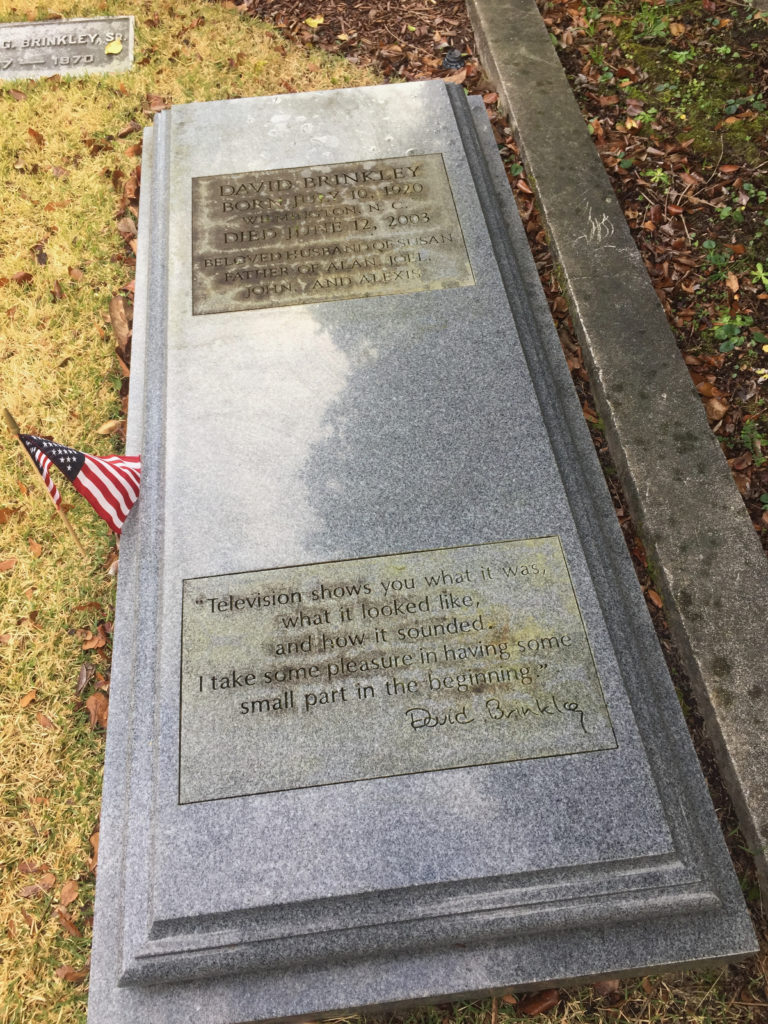Erik Visits an American Grave, Part 950
This is the grave of David Brinkley.

Born in 1920 in Wilmington, North Carolina, Brinkley became interested in journalism from a young age, working on his high school newspaper. He went to the University of North Carolina, followed by stints at Emory and Vanderbilt, also working on papers there. But before he graduated, he joined the military in 1940 and served until 1943. He got a job working for United Press International, covering the South. But he was ambitious and soon moved to Washington, hoping to break into the big time. He got a job with NBC and quite soon became its White House correspondent, despite his young age.
Brinkley had a voice and face for TV. He soon became a star for NBC through this new technology. In 1956, NBC decided to pair him with Chet Huntley to cover the political conventions that year. A new star team was born. Despite the network’s concerns over how they would work together, they were stars. They took over the evening news report, now called the Huntley–Brinkley Report, just before the general election that fall. Brinkley was already the definition of the Washington insider. Popular, he got invited to all the right parties. Politicians would give him tips, knowing he would use them judiciously. He wasn’t particularly partisan and in an era of relatively low partisanship, he could work all sides of a story. The downside of the Beltway insider has become crystal clear in recent decades and Brinkley absolutely was one of the founders of that world.
Huntley-Brinkley dominated the television news world until the late 60s, when Cronkite became more popular. In fact, they were so dominant that they had an 84% viewing share of the 1964 Democratic National Convention, despite the other networks covering it. Even after Cronkite’s rise, the show was still a major player and Brinkley still a huge star. He had other news shows as well, often winning awards for his coverage. After Huntley retired in 1970 though, things started going downhill at NBC. The broadcasts that followed were less successful with viewers, though still critically acclaimed. Brinkley had less chemistry with other co-hosts such as John Chancellor. His side projects news shows weren’t as successful as they had been in the 50s and 60s. So in 1981, he quit. ABC instantly signed him to host This Week with David Brinkley, ABC’s Sunday morning news show and the precursor to its current show. These shows are universally terrible, pushing center-right Beltway doctrine while pretending like one side, in fact their preferred side, is not dedicated to fascism. I highly doubt Brinkley would have responded to this any better than the current anchors of these shows. He was pretty committed to Beltway norms. He just happened to operate at a time when the politics were less overtly violent and anti-democratic than they are today.
It was rare for Brinkley to express any actual opinion publicly. But in 1996, just before his final retirement, he was caught with a hot mic at the 1996 DNC calling Bill Clinton a “bore” and stating “The next four years will be filled with pretty words and pretty music and a lot of goddamn nonsense!” I mean, I don’t necessarily disagree with this about the Clinton administration, but I strongly suspect I would find it a lot of goddamn nonsense for a very different reason than Brinkley. He mostly retired at the end of that year, but occasionally contributed into 1997.
George H.W. Bush gave Brinkley the Presidential Medal of Freedom in 1992, the ultimate sign of the Beltway partnership between the news and the Republican Party. Brinkley was such a Beltway figure that he learned a key lesson–he could cash in after retirement and use his power as a trusted person to lobby for a company. Archer Daniels Midland hired him in 1998 to become their spokesman. See, ADM had recently gotten in huge trouble for price-fixing, having received a $100 million fine in 1996. So how to regain trust? How about ask a trusted journalist! Brinkley said yes. People were outraged. But I mean, they really shouldn’t have been. Why would we “trust” Brinkley or Cronkite or Murrow or anyone in the media? First, we know they are all pro-capitalist. Second, the myth of these journalist figures being ABOVE THE NEWS is such a relic of the Baby Boomer era, when REPORTERS WERE VOICES OF GOD. This nostalgia is tremendously damaging, helping cover up for, say, the fact that Fox News has a lot more in common with most of American media history than the Brinkley-Cronkite-Murrow interregnum of the 50s-70s. At the very least, it’s pretty clear that Brinkley didn’t care about any of this, not enough to see any problem with him selling his voice to ADM, talking about how much he trusted the company to provide Americans food. The criticism of the commercial let it to being pulled.
Brinkley died in 2003 after a fall. He was 82 years old.
David Brinkley is buried in Oakdale Cemetery, Wilmington, North Carolina.
If you would like this series to visit other TV news figures, you can donate to cover the required expenses here. Chet Huntley is in Bozeman, Montana and Frank Reynolds is in Arlington. Previous posts in this series are archived here.


